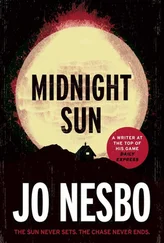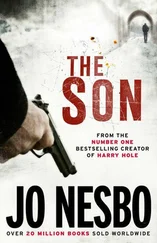Jo Nesbo - The Redbreast
Здесь есть возможность читать онлайн «Jo Nesbo - The Redbreast» весь текст электронной книги совершенно бесплатно (целиком полную версию без сокращений). В некоторых случаях можно слушать аудио, скачать через торрент в формате fb2 и присутствует краткое содержание. Жанр: Триллер, на английском языке. Описание произведения, (предисловие) а так же отзывы посетителей доступны на портале библиотеки ЛибКат.
- Название:The Redbreast
- Автор:
- Жанр:
- Год:неизвестен
- ISBN:нет данных
- Рейтинг книги:4 / 5. Голосов: 1
-
Избранное:Добавить в избранное
- Отзывы:
-
Ваша оценка:
- 80
- 1
- 2
- 3
- 4
- 5
The Redbreast: краткое содержание, описание и аннотация
Предлагаем к чтению аннотацию, описание, краткое содержание или предисловие (зависит от того, что написал сам автор книги «The Redbreast»). Если вы не нашли необходимую информацию о книге — напишите в комментариях, мы постараемся отыскать её.
The Redbreast — читать онлайн бесплатно полную книгу (весь текст) целиком
Ниже представлен текст книги, разбитый по страницам. Система сохранения места последней прочитанной страницы, позволяет с удобством читать онлайн бесплатно книгу «The Redbreast», без необходимости каждый раз заново искать на чём Вы остановились. Поставьте закладку, и сможете в любой момент перейти на страницу, на которой закончили чтение.
Интервал:
Закладка:
Harry checked his watch and read on.
Leningrad. New Year's Eve 1942.
… when I saw the fear in Sindre Fauke's eyes I had to say a few reassuring words to him to relax his vigilance. It was just us two out there at the machine-gun post; the others had gone to their bunks, and Daniel's body lay rigid on top of the ammunition boxes. Then I scratched more of Daniel's blood off the cartridge belt. The moon was shining and it was snowing, an extraordinary night, and I thought that now I would collect the remains of Daniel and put him together again, make him whole so that he could stand up and lead us. Sindre Fauke didn't understand this. He was a hanger-on, an opportunist and an informer who only followed those he thought would win. And the day things looked darkest for me, for us, for Daniel, he would also betray us. I took a swift pace back, so that I was behind him, seized his forehead and swung the bayonet. You have to be fairly deft to get a deep, clean cut. I let go as soon as I had sliced him for I knew the job was done. He turned round slowly and stared at me with those small piggy eyes of his; he seemed to want to scream but the bayonet had severed his windpipe and only a whistling sound came from the gaping wound. And blood. He grabbed his throat with both hands to prevent his life running out, but that only made the blood squirt out in fine jets between his fingers. I fell and had to scrabble backwards in the snow not to get it on my uniform. Fresh bloodstains would not look good if they decided to investigate Sindre Fauke's 'desertion'.
When he no longer moved, I turned him on his back and dragged him over to the ammunition boxes on which Daniel was lying. Fortunately, they had a similar build. I found Sindre Fauke's ID papers. (We always keep them on us, day and night, because if we are stopped and have no papers on us saying who we are and what our orders are (infantry, Northern Front, date, stamp and so on) we risk being shot on the spot as deserters.) I rolled up Sindre's papers and stuffed them into the canteen attached to my cartridge belt. Then I took the sack off Daniel's head and wrapped it round Sindre's. Next I put Daniel on my back and carried him out into no man's land. And there I buried him in the snow, as Daniel had buried Uriah, the Russian. I kept Daniel's Russian cap. Sang a psalm. 'A mighty fortress is our God'. And 'Join the circle of men round the fire'.
Leningrad. 3 January 1943.
A mild winter. Everything has gone according to plan. Early in the morning of 1 January the corpse-bearers came and took away the body from the ammunition boxes as they had been instructed. Naturally, they believed it to be Daniel Gudeson they were dragging on the sledge to the Northern Sector. I still have to laugh whenever I think about it. I don't know if they took the sacking off the head before dumping him into the mass pit; it would not have bothered me anyway as the corpse-bearers knew neither Daniel nor Sindre Fauke.
The only thing that bothers me is that Edvard Mosken seems to suspect Fauke did not desert and that I killed him. There is not a great deal he can do. Sindre Fauke's body is lying with hundreds of others, burned (may his soul burn for ever) and unrecognisable.
But last night when I was on watch I had to undertake the boldest operation so far. Gradually I had come to realise that I couldn't leave Daniel's body buried in the snow. With the mild winter there was a good chance the body could become exposed at any moment and reveal the switch. And when I began to dream at night about what foxes and polecats would do with Daniel's body as the snow melted in spring, I decided to dig up the body and have it put in the mass grave-after all, that was consecrated ground.
Of course, I was more frightened by our own sentry posts than by the Russians, but fortunately it was Hallgrim Dale, Fauke's slow-witted comrade, sitting in the machine-gun nest. On top of that, it was a cloudy night and, even more important, I felt that Daniel was with me, yes, that he was in me. And when I had finally manoeuvred the corpse on to the ammunition boxes and was about to tie the sack around his head, he smiled. I know that lack of sleep and hunger can play tricks with your mind, but I did see his rigid death-mask change in front of my very eyes.
The extraordinary thing was that instead of frightening me, it made me feel secure and happy. Then I sneaked back into the bunker, where I fell asleep like a child.
When Edvard Mosken woke me up an hour later, it was as if I had been dreaming the whole thing and I think I managed to appear genuinely surprised to see that Daniel's body had turned up again. But this was not enough to convince Edvard Mosken. He was sure it was Fauke's body, sure I had killed him and had put his body there in the hope that the corpse-bearers would think they had forgotten to collect him the first time and take him along. Dale removed the sacking and Mosken saw that it was Daniel. They both gaped, open-mouthed, and I had to fight to restrain the laughter inside me from bursting out and giving us-Daniel and me-away.
Field Hospital, Northern Sector, Leningrad. 17 January 1944.
The hand-grenade that was thrown from the Russian plane hit Dale on the helmet and spun around on the ice as we tried to move away. I was closest and was sure all three of us would die: Mosken, Dale and me. It is strange, but my last thought was what an irony of fate it was that I had just saved Edvard Mosken from being shot by Dale, the poor man, and my sole achievement was to extend the life of our section leader by exactly two minutes. Fortunately, however, the Russians make terrible hand-grenades and we all survived with our lives intact. As for me, I had an injured foot and shrapnel had sliced through my helmet into my forehead.
By a remarkable coincidence I ended up in Daniel's fiancee's ward, with Sister Signe Alsaker. At first she didn't recognise me, but in the afternoon she came over and spoke to me in Norwegian. She is very beautiful and I know only too well why I wanted to be engaged to her.
Olaf Lindvig is also in this ward. That white leather tunic of his hangs on a hook by his bed. I don't know why-perhaps so that he can walk right out and back to the duties awaiting him as soon as his injuries have healed. Men of his calibre are needed now; I can hear the Russian artillery fire closing in. One night he was having nightmares, I think, because he screamed, and Sister Signe came in. She gave him an injection of something, morphine perhaps. When he went to sleep again, I saw her stroke his hair. She was so beautiful that I felt like calling her over to my bed and telling her who I was, but I didn't want to frighten her.
Today they said I was to be sent to the west because medicines were not getting through. No one said anything, but my foot is painful, the Russians are coming closer and I know this is my only hope for survival.
Vienna Woods. 29 May 1944
The most beautiful and the most intelligent woman I have ever met in my life. Can you love two women at once? Yes, you certainly can.
Gudbrand has changed. That is why I have taken Daniel's nickname-Uriah. Helena preferred it. Gudbrand was an odd name, she thought.
I write poems when the others have gone to sleep, but I'm not much of a poet. My heart beats wildly when she appears in the doorway, but Daniel says you have to stay calm, well, almost cold, if you want to win a woman's heart. It is like catching flies: you have to sit quite still, preferably looking in another direction. And then, when the fly has begun to trust you -when it lands on the table in front of you, goes closer and finally almost begs you to try and catch it-then you strike as quick as lightning, firm and sure in your convictions. The latter is the most important. It is not speed but conviction that catches flies. You have one chance-and you must be ready for it, Daniel says.
Читать дальшеИнтервал:
Закладка:
Похожие книги на «The Redbreast»
Представляем Вашему вниманию похожие книги на «The Redbreast» списком для выбора. Мы отобрали схожую по названию и смыслу литературу в надежде предоставить читателям больше вариантов отыскать новые, интересные, ещё непрочитанные произведения.
Обсуждение, отзывы о книге «The Redbreast» и просто собственные мнения читателей. Оставьте ваши комментарии, напишите, что Вы думаете о произведении, его смысле или главных героях. Укажите что конкретно понравилось, а что нет, и почему Вы так считаете.












